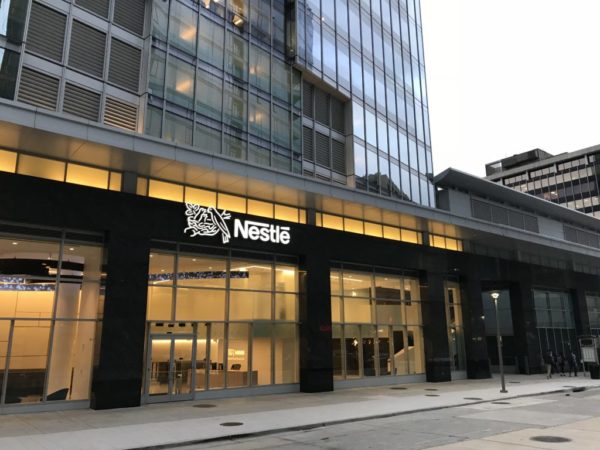A new donation from Nestlé will help some low-income households in Arlington afford child care.
The food and beverage company, which recently announced an expansion of its U.S. headquarters in Rosslyn, is donating $200,000 to the Arlington Community Foundation’s child care scholarship program.
The foundation is hoping to raise $2.7 million to provide financial assistance for 200 kids over the next 5 years.
“Arlington has the highest child care costs in the region,” the foundation noted in a press release, below. “A family of four with one infant and one four-year old can spend more than $42,000 per year on child care. Yet, nearly 2,600 Arlington children under age 6 live in families whose household income is $36,000 or below.”
The average annual scholarship per child will be $13,700, ACF said.
Arlington County has launched its own initiative to support more child care options locally, including by making key zoning and regulatory changes. County Board member Katie Cristol wrote last month that there’s a shortage of childcare options in Arlington, driving up costs.
“Supply shortages were worse than we thought: Known capacity is sufficient to serve only 54% of Arlington’s children under five, despite data indicating that most Arlington children live in families where all parents work,” Cristol wrote.
More on the donation, from the Arlington Community Foundation, is below after the jump.
The Arlington Community Foundation today announced that Rosslyn-based Nestlé USA will fund $200,000 in child care scholarships to ensure safe, affordable care for children living in the lowest income Arlington families. This contribution represents the first investment toward the Community Foundation’s goal of creating a $2.7 million scholarship pool to assist 200 children in Arlington over the next 5 years.
“Every parent should have the opportunity to participate in the workforce and provide for their families without compromising the quality of their children’s care,” said Community Foundation President and CEO Jennifer Owens. “Nestlé is showing tremendous compassion and leadership in providing this gift to increase access to affordable care for our most vulnerable families.”
Arlington has the highest child care costs in the region. A family of four with one infant and one four-year old can spend more than $42,000 per year on child care. Yet, nearly 2,600 Arlington children under age 6 live in families whose household income is $36,000 or below. The average annual scholarship per child is $13,700.
“Nestlé’s commitment to enhancing quality of life for kids in the communities in which we live and work is part of our DNA, “said Nicole Collier, Director, Government Relations at Nestlé USA. “We’re proud to support this program and whether it be through this donation of funds to the Foundation to support critical child care services or by providing access to nutritious foods for individuals and families in the area, we are dedicated to being an active member of this community.”
“Quality child care stabilizes families,” said County Board member Katie Cristol. “It enables parents to pursue economic and educational opportunities, and helps children develop in ways that prepare them for school and beyond. This fund is integral to Arlington’s Child Care Initiative, which strives to increase the availability, accessibility, and quality of child care in our community.”
Child care affordability is one of three key areas the Community Foundation is addressing through its Shared Prosperity initiative, which brings together businesses, government, and nonprofits to prevent the displacement of Arlington’s lowest-income households. The other key priorities are affordable housing and workforce development.
Nestlé scholarships will fill a critical gap in Arlington, said Owens. Currently, the County relies on state subsidies that are neither plentiful nor flexible enough to meet actual needs. For example, the State requires parents applying for the subsidies to legally pursue child support income first, an action that many decline to take for safety reasons. These scholarship funds will allow such parents to gain access to quality licensed care in a home day care setting or a center. The private scholarships will also be more appealing to providers because the scholarships involve less red tape than many state subsidies.
“The rules that go along with the government-funded subsidies can sometimes create disincentives for those providing child care as well as those in need of it,” said Owens. “To achieve lasting success with these initiatives, we must truly support low-income residents to reach their potential in a sustainable way.”
The Community Foundation is pursuing additional funding for strategies across the priority areas for the Shared Prosperity Initiative, including this child care scholarship fund. Visit www.arlcf.org/sharedprosperity for more information.


